Five Reasons To Dive Deep Into Gone Girl
"The New York Times Bestselling juggernaut hits theaters this weekend, and you'll want to be prepared."
Gillian Flynn’s
Gone Girl is a bit of a rarity in the novel world. A book that had no name recognition, written by a little-known author, about a seemingly vanilla subject, that went on to dominate the New York Times Bestseller List for
52 weeks thanks to fervent word-of-mouth and a heaping dose of “Believe me, this book isn’t what you think it is.” And even following its dethroning of that top spot, it was discussed, dissected, and heralded as not only a vivid study of modern marriage, but of our own tragedy obsessed culture. The announcement that David Fincher, the master of the low-key gut-punch in movies such as
Fight Club and
The Social Network, would adapt the book for the screen (with Flynn adapting her own novel into a screenplay) rocketed the book back into the conversation when it began to dissipate in 2013.
Now the film, opening this Friday, is almost upon us. And through moody trailers, mysterious artwork, and near impeccable casting, it’s easy to wonder: is this the absolute perfect marriage of director and material? Could be, we’ll soon find out.
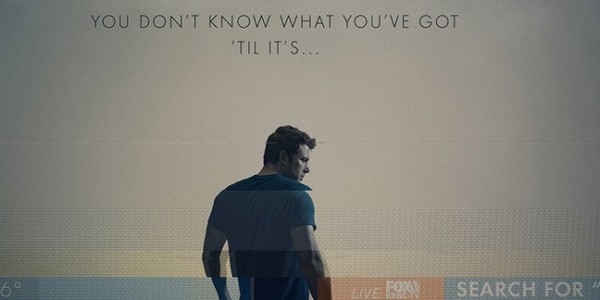
But today isn’t about the movie so much as it is about the book. And like I said in my
retrospective for
The Maze Runner, I won’t waste your time speculating on what could and should be for the film. You can come back this weekend to hear my thoughts on it after I’ve seen it. Today I have one goal in mind: to prepare you. Maybe even get you to binge read the book before Friday. It’s an easy read (I know two people that’ve blown through cover-to-cover in a matter of a weekend), and this is the kind of movie you want to be prepared for: it’s dense, brooding, and seductive in its intensity. And if you have already read it, well, just sit back and enjoy the attempted organization of my expectedly scattered thoughts on one of the most brilliantly twisted novels in recent years. (With no spoilers, I promise).
As a quick back story on the novel: well, there’s unfortunately not really a whole lot that can be said about
Gone Girl without ruining the multitude of its violent surprises. It’s about a husband whose wife disappears and soon meets a wave of accusations and hushed
he did it whispers. It’s also a study, like I said, of modern marriage and a parody of our image-obsessed, easy-to-accuse, crime-addicted world. And no matter how smart of a reader you think you are, how you always expect to be two steps ahead of the author and claim to predict twists and turns and surprises – this thing will get you. Bad.
Firstly: I already covered this a bit, but it bears repeating: this isn’t a love story. It’s a story
about a couple who fell in love, but the novel’s heart and soul is much darker, much more menacing than something so Nicholas Sparksian as meet-cutes and grand romantic gestures. It has these things, in abundance actually, but Flynn deftly subverts our knowledge of what we expect from these clichés, even what she presents them as herself.
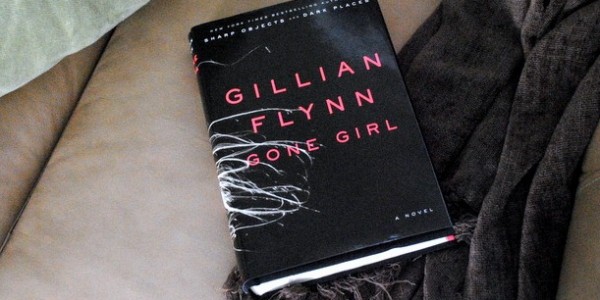
The book concerns Nick Dunne, a washed up magazine journalist who whisks his doting but concerned wife – Amy Elliott-Dunne – off to Nick’s home town of Carthage, Missouri after they both lose their jobs. He claims he needs to take care of his ailing mother and lost-in-senility father, but in Amy’s eyes he mostly does neither. The book’s told in alternating chapters: Nick’s a snarky, bitter bite of wit after the eponymous Girl gets Gone’d; and Amy's, seen from her diary entries of the lustful early years of their courtship. He’s sarcastic and flippant, and she’s smitten and in love. But is either a sociopath?
When Nick and Amy meet in a flashback early on in the book, it’s a cute, diverting slice of the innocence at the beginning of every relationship. But then it gets twisted into a hideous, grotesque version of itself in the book’s second half, and is the perfect microcosm of the book as a whole: a seemingly innocent, innocuous element of your life (like love for your significant other) that can grow and become unruly, unnerving, and completely uncontrollable.
It’s a story about broken love, if anything. About how you can think you know someone, discover a completely hidden side of them, and struggle with redefining your relationship after the fact. It’s a complex idea, not something easily digestible, and utterly worthy of applause for the fact that Flynn created a bestseller around it.
Second reason: it’s a genuine mystery, an old-school whodunit. You have all the clues, all the evidence you need. The novel’s opening sections preoccupy you with the minutiae of the case: an overturned ottoman, a blood stain in the kitchen, broken glass in the living room, a missing wife, an increasingly guilty husband. Who do you think did it? Her ex lover? Her clingy neighbor? Her husband? Is she dead at all, or did she just run away?
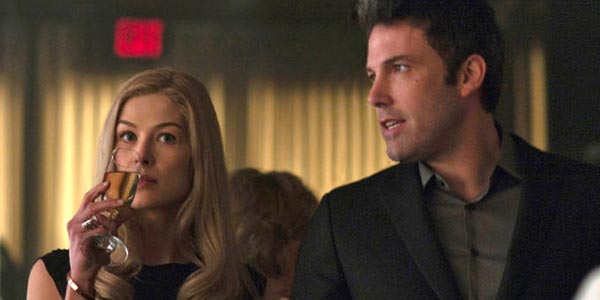
Nick's chapters mainly focus on the whirlwind of an investigation that hits after Amy's disappearance from their house the morning of their fifth wedding anniversary. Flynn's perhaps greatest feat in the novel (among many) is how she toes the line between making you simultaneously adore her characters, yet have permanently entrenched in the back of your head:
but he could have probably murdered his wife, yes. Nick is an idiot and does undeniably idiotic things throughout the novel, especially considering the circumstances. But he is self-aware; he doles out brutal honesty about others (marking on Rhonda Boney, a police inspector, and her poor features) as well as himself ("I have a face you want to punch.")
Flynn lines the beginning of each chapter with a big, bold heading of the character's name and how many days Amy has been gone. The latter is perhaps of purpose, but she characterizes the two leads so perfectly, painting a huge canvas of their quirks, cadences and opinions, the former becomes increasingly superfluous.
There are a myriad array of doors Flynn presents you with, as well, all leading to the answer, the one solution to everything. It’s absolutely, genuinely intriguing to work your way through those first 200-or-so pages along with the characters, picking up new clues, piecing it all together. It’s a masterwork of craftsmanship and - unlike some mysteries that crumble under the pressure - it absolutely sticks the landing.
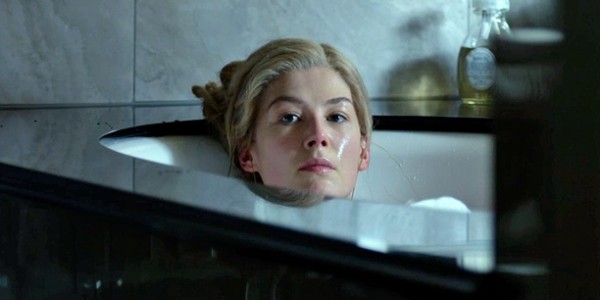
Speaking of, if there is a point to be made in the favor of experiencing this story, it’s the twist. Sometimes it’s spoilerish to even reveal there’s a twist in a work of fiction, but the praise of
Gone Girl, the devilish charm, just can’t be expressed without it. That’s why it’s my third point. Flynn has you in detective mode for the first half, by then you're probably leaning heavily towards one theory or the other.
Then, the rug-pulling. It’s a twist that keeps on giving: in the beginning it appears incongruous, you tell yourself it doesn’t make sense, that it can’t be true. Then you’re told in vivid detail for a few hundred more pages the exact how, why, where, when, and how of it all. It’s a real twist, a meaty rug-pulling, a world-class head-spin that, despite its location mid-way through, makes you as voracious as ever to discover more about it.
Which is all a testament to point four: Flynn’s writing. She writes in an animalistic, furious way that demands you to eat through chapters in a sitting, making for a caustically fun binge, but slowing down and re-reading lines is absolutely required. What would be throw-away lines in lesser hands hide brilliant, skewering gems, each exposing the true character of whoever is thinking it at the time.
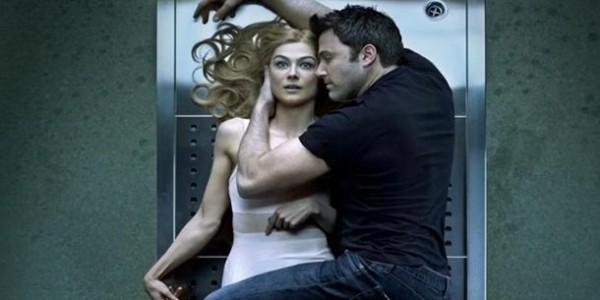
Here, for example, is one of my favorites: “My thank-yous always come out rather labored. I often don’t give them at all. People do what they’re supposed to do and then wait for you to pile on the appreciation – they’re like frozen-yogurt employees who put out cups for tips.” It’s something that could easily come off with a certain air of pretension, but the context of the quote, the moment of its bursting into that particular character’s head, is perfect. Like everything else in the book, it all fits a purpose – no single line is throwaway.
This is an addictive, read-it-in-one-sitting-if-you-have-time book, for the first half. A murder-mystery of impossible-to-predict circumstances that you have no idea where it's going to end up. Then Flynn punches you in the gut about half-way through, and doesn't lay off for 200 pages more. Which leads me to my final point: the slow introduction of one of the creepiest, most terrifying villains I've ever encountered in literature. Or anywhere, for that matter. They're calculating, smart, and utterly cognizant of their psychopathy.
But perhaps most terrifying? They show the ability to have no sense of self-preservation, willing to meet their own end just to triumph over others. It's shiver-inducing, nightmarishly brilliant stuff. But the “villain” terminology is almost too succinct here. Flynn doesn’t work in the black and white spectrum, she’s a full-on shades of grey kind of writer. The good guys do horrible things that will have you yelling at the pages, and the antagonist, in the traditional, literal sense, performs their duty tremendously. But they’re interestingly flawed, not entirely redeemable, but just grey enough to be relatable.
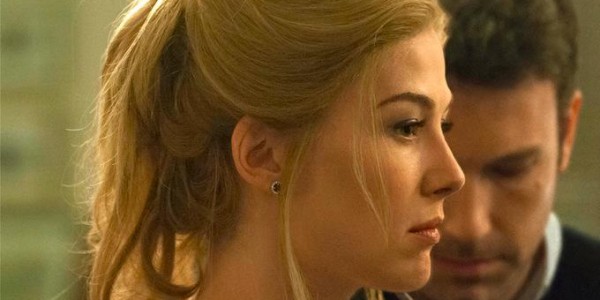
Fincher’s adaptation has huge hurdles facing it, especially in that second-act reveal. Its 149 minute running time assures me that all involved parties took the material seriously and aren’t pulling any punches, but it does bring up a topic I haven’t mentioned yet: Flynn herself has stated the book’s ending is being changed for the new medium.
Like everything else about the book, I adore the novel’s penchant for refusing to tie the story up in a pretty bow. The ending is as muddy, dangerous and disquieting as the story that preceded it. I have faith that a director as unafraid of daring-do as Fincher and the author herself won’t dilute the finale into a Hollywood affair of justice and happiness, but it is my biggest apprehension going into this weekend. Check back later in the week for my final thoughts on this part of the adaptation, and the film as a whole in my review.
In the end,
Gone Girl is a story of big, important, topical ideas masquerading as a silly hard-boiled slice of crime fiction. When you're finished reading it, still suffering from whiplish because of all of its jagged, dangerous literary corkscrews, the book becomes something more. More than a murder-mystery, more than a satire of our Dateline and 20/20 zeitgeisty world - it becomes a question. One that most couples probably end up asking themselves: how did we start off so well, and end up here? And the amazing thing about Flynn is that she actually has the balls to answer it.
Gone Girl opens wide October 3rd. Check out my review
here.
 But today isn’t about the movie so much as it is about the book. And like I said in my retrospective for The Maze Runner, I won’t waste your time speculating on what could and should be for the film. You can come back this weekend to hear my thoughts on it after I’ve seen it. Today I have one goal in mind: to prepare you. Maybe even get you to binge read the book before Friday. It’s an easy read (I know two people that’ve blown through cover-to-cover in a matter of a weekend), and this is the kind of movie you want to be prepared for: it’s dense, brooding, and seductive in its intensity. And if you have already read it, well, just sit back and enjoy the attempted organization of my expectedly scattered thoughts on one of the most brilliantly twisted novels in recent years. (With no spoilers, I promise).
As a quick back story on the novel: well, there’s unfortunately not really a whole lot that can be said about Gone Girl without ruining the multitude of its violent surprises. It’s about a husband whose wife disappears and soon meets a wave of accusations and hushed he did it whispers. It’s also a study, like I said, of modern marriage and a parody of our image-obsessed, easy-to-accuse, crime-addicted world. And no matter how smart of a reader you think you are, how you always expect to be two steps ahead of the author and claim to predict twists and turns and surprises – this thing will get you. Bad.
Firstly: I already covered this a bit, but it bears repeating: this isn’t a love story. It’s a story about a couple who fell in love, but the novel’s heart and soul is much darker, much more menacing than something so Nicholas Sparksian as meet-cutes and grand romantic gestures. It has these things, in abundance actually, but Flynn deftly subverts our knowledge of what we expect from these clichés, even what she presents them as herself.
But today isn’t about the movie so much as it is about the book. And like I said in my retrospective for The Maze Runner, I won’t waste your time speculating on what could and should be for the film. You can come back this weekend to hear my thoughts on it after I’ve seen it. Today I have one goal in mind: to prepare you. Maybe even get you to binge read the book before Friday. It’s an easy read (I know two people that’ve blown through cover-to-cover in a matter of a weekend), and this is the kind of movie you want to be prepared for: it’s dense, brooding, and seductive in its intensity. And if you have already read it, well, just sit back and enjoy the attempted organization of my expectedly scattered thoughts on one of the most brilliantly twisted novels in recent years. (With no spoilers, I promise).
As a quick back story on the novel: well, there’s unfortunately not really a whole lot that can be said about Gone Girl without ruining the multitude of its violent surprises. It’s about a husband whose wife disappears and soon meets a wave of accusations and hushed he did it whispers. It’s also a study, like I said, of modern marriage and a parody of our image-obsessed, easy-to-accuse, crime-addicted world. And no matter how smart of a reader you think you are, how you always expect to be two steps ahead of the author and claim to predict twists and turns and surprises – this thing will get you. Bad.
Firstly: I already covered this a bit, but it bears repeating: this isn’t a love story. It’s a story about a couple who fell in love, but the novel’s heart and soul is much darker, much more menacing than something so Nicholas Sparksian as meet-cutes and grand romantic gestures. It has these things, in abundance actually, but Flynn deftly subverts our knowledge of what we expect from these clichés, even what she presents them as herself.
 The book concerns Nick Dunne, a washed up magazine journalist who whisks his doting but concerned wife – Amy Elliott-Dunne – off to Nick’s home town of Carthage, Missouri after they both lose their jobs. He claims he needs to take care of his ailing mother and lost-in-senility father, but in Amy’s eyes he mostly does neither. The book’s told in alternating chapters: Nick’s a snarky, bitter bite of wit after the eponymous Girl gets Gone’d; and Amy's, seen from her diary entries of the lustful early years of their courtship. He’s sarcastic and flippant, and she’s smitten and in love. But is either a sociopath?
When Nick and Amy meet in a flashback early on in the book, it’s a cute, diverting slice of the innocence at the beginning of every relationship. But then it gets twisted into a hideous, grotesque version of itself in the book’s second half, and is the perfect microcosm of the book as a whole: a seemingly innocent, innocuous element of your life (like love for your significant other) that can grow and become unruly, unnerving, and completely uncontrollable.
It’s a story about broken love, if anything. About how you can think you know someone, discover a completely hidden side of them, and struggle with redefining your relationship after the fact. It’s a complex idea, not something easily digestible, and utterly worthy of applause for the fact that Flynn created a bestseller around it.
Second reason: it’s a genuine mystery, an old-school whodunit. You have all the clues, all the evidence you need. The novel’s opening sections preoccupy you with the minutiae of the case: an overturned ottoman, a blood stain in the kitchen, broken glass in the living room, a missing wife, an increasingly guilty husband. Who do you think did it? Her ex lover? Her clingy neighbor? Her husband? Is she dead at all, or did she just run away?
The book concerns Nick Dunne, a washed up magazine journalist who whisks his doting but concerned wife – Amy Elliott-Dunne – off to Nick’s home town of Carthage, Missouri after they both lose their jobs. He claims he needs to take care of his ailing mother and lost-in-senility father, but in Amy’s eyes he mostly does neither. The book’s told in alternating chapters: Nick’s a snarky, bitter bite of wit after the eponymous Girl gets Gone’d; and Amy's, seen from her diary entries of the lustful early years of their courtship. He’s sarcastic and flippant, and she’s smitten and in love. But is either a sociopath?
When Nick and Amy meet in a flashback early on in the book, it’s a cute, diverting slice of the innocence at the beginning of every relationship. But then it gets twisted into a hideous, grotesque version of itself in the book’s second half, and is the perfect microcosm of the book as a whole: a seemingly innocent, innocuous element of your life (like love for your significant other) that can grow and become unruly, unnerving, and completely uncontrollable.
It’s a story about broken love, if anything. About how you can think you know someone, discover a completely hidden side of them, and struggle with redefining your relationship after the fact. It’s a complex idea, not something easily digestible, and utterly worthy of applause for the fact that Flynn created a bestseller around it.
Second reason: it’s a genuine mystery, an old-school whodunit. You have all the clues, all the evidence you need. The novel’s opening sections preoccupy you with the minutiae of the case: an overturned ottoman, a blood stain in the kitchen, broken glass in the living room, a missing wife, an increasingly guilty husband. Who do you think did it? Her ex lover? Her clingy neighbor? Her husband? Is she dead at all, or did she just run away?
 Nick's chapters mainly focus on the whirlwind of an investigation that hits after Amy's disappearance from their house the morning of their fifth wedding anniversary. Flynn's perhaps greatest feat in the novel (among many) is how she toes the line between making you simultaneously adore her characters, yet have permanently entrenched in the back of your head: but he could have probably murdered his wife, yes. Nick is an idiot and does undeniably idiotic things throughout the novel, especially considering the circumstances. But he is self-aware; he doles out brutal honesty about others (marking on Rhonda Boney, a police inspector, and her poor features) as well as himself ("I have a face you want to punch.")
Flynn lines the beginning of each chapter with a big, bold heading of the character's name and how many days Amy has been gone. The latter is perhaps of purpose, but she characterizes the two leads so perfectly, painting a huge canvas of their quirks, cadences and opinions, the former becomes increasingly superfluous.
There are a myriad array of doors Flynn presents you with, as well, all leading to the answer, the one solution to everything. It’s absolutely, genuinely intriguing to work your way through those first 200-or-so pages along with the characters, picking up new clues, piecing it all together. It’s a masterwork of craftsmanship and - unlike some mysteries that crumble under the pressure - it absolutely sticks the landing.
Nick's chapters mainly focus on the whirlwind of an investigation that hits after Amy's disappearance from their house the morning of their fifth wedding anniversary. Flynn's perhaps greatest feat in the novel (among many) is how she toes the line between making you simultaneously adore her characters, yet have permanently entrenched in the back of your head: but he could have probably murdered his wife, yes. Nick is an idiot and does undeniably idiotic things throughout the novel, especially considering the circumstances. But he is self-aware; he doles out brutal honesty about others (marking on Rhonda Boney, a police inspector, and her poor features) as well as himself ("I have a face you want to punch.")
Flynn lines the beginning of each chapter with a big, bold heading of the character's name and how many days Amy has been gone. The latter is perhaps of purpose, but she characterizes the two leads so perfectly, painting a huge canvas of their quirks, cadences and opinions, the former becomes increasingly superfluous.
There are a myriad array of doors Flynn presents you with, as well, all leading to the answer, the one solution to everything. It’s absolutely, genuinely intriguing to work your way through those first 200-or-so pages along with the characters, picking up new clues, piecing it all together. It’s a masterwork of craftsmanship and - unlike some mysteries that crumble under the pressure - it absolutely sticks the landing.
 Speaking of, if there is a point to be made in the favor of experiencing this story, it’s the twist. Sometimes it’s spoilerish to even reveal there’s a twist in a work of fiction, but the praise of Gone Girl, the devilish charm, just can’t be expressed without it. That’s why it’s my third point. Flynn has you in detective mode for the first half, by then you're probably leaning heavily towards one theory or the other.
Then, the rug-pulling. It’s a twist that keeps on giving: in the beginning it appears incongruous, you tell yourself it doesn’t make sense, that it can’t be true. Then you’re told in vivid detail for a few hundred more pages the exact how, why, where, when, and how of it all. It’s a real twist, a meaty rug-pulling, a world-class head-spin that, despite its location mid-way through, makes you as voracious as ever to discover more about it.
Which is all a testament to point four: Flynn’s writing. She writes in an animalistic, furious way that demands you to eat through chapters in a sitting, making for a caustically fun binge, but slowing down and re-reading lines is absolutely required. What would be throw-away lines in lesser hands hide brilliant, skewering gems, each exposing the true character of whoever is thinking it at the time.
Speaking of, if there is a point to be made in the favor of experiencing this story, it’s the twist. Sometimes it’s spoilerish to even reveal there’s a twist in a work of fiction, but the praise of Gone Girl, the devilish charm, just can’t be expressed without it. That’s why it’s my third point. Flynn has you in detective mode for the first half, by then you're probably leaning heavily towards one theory or the other.
Then, the rug-pulling. It’s a twist that keeps on giving: in the beginning it appears incongruous, you tell yourself it doesn’t make sense, that it can’t be true. Then you’re told in vivid detail for a few hundred more pages the exact how, why, where, when, and how of it all. It’s a real twist, a meaty rug-pulling, a world-class head-spin that, despite its location mid-way through, makes you as voracious as ever to discover more about it.
Which is all a testament to point four: Flynn’s writing. She writes in an animalistic, furious way that demands you to eat through chapters in a sitting, making for a caustically fun binge, but slowing down and re-reading lines is absolutely required. What would be throw-away lines in lesser hands hide brilliant, skewering gems, each exposing the true character of whoever is thinking it at the time.
 Here, for example, is one of my favorites: “My thank-yous always come out rather labored. I often don’t give them at all. People do what they’re supposed to do and then wait for you to pile on the appreciation – they’re like frozen-yogurt employees who put out cups for tips.” It’s something that could easily come off with a certain air of pretension, but the context of the quote, the moment of its bursting into that particular character’s head, is perfect. Like everything else in the book, it all fits a purpose – no single line is throwaway.
This is an addictive, read-it-in-one-sitting-if-you-have-time book, for the first half. A murder-mystery of impossible-to-predict circumstances that you have no idea where it's going to end up. Then Flynn punches you in the gut about half-way through, and doesn't lay off for 200 pages more. Which leads me to my final point: the slow introduction of one of the creepiest, most terrifying villains I've ever encountered in literature. Or anywhere, for that matter. They're calculating, smart, and utterly cognizant of their psychopathy.
But perhaps most terrifying? They show the ability to have no sense of self-preservation, willing to meet their own end just to triumph over others. It's shiver-inducing, nightmarishly brilliant stuff. But the “villain” terminology is almost too succinct here. Flynn doesn’t work in the black and white spectrum, she’s a full-on shades of grey kind of writer. The good guys do horrible things that will have you yelling at the pages, and the antagonist, in the traditional, literal sense, performs their duty tremendously. But they’re interestingly flawed, not entirely redeemable, but just grey enough to be relatable.
Here, for example, is one of my favorites: “My thank-yous always come out rather labored. I often don’t give them at all. People do what they’re supposed to do and then wait for you to pile on the appreciation – they’re like frozen-yogurt employees who put out cups for tips.” It’s something that could easily come off with a certain air of pretension, but the context of the quote, the moment of its bursting into that particular character’s head, is perfect. Like everything else in the book, it all fits a purpose – no single line is throwaway.
This is an addictive, read-it-in-one-sitting-if-you-have-time book, for the first half. A murder-mystery of impossible-to-predict circumstances that you have no idea where it's going to end up. Then Flynn punches you in the gut about half-way through, and doesn't lay off for 200 pages more. Which leads me to my final point: the slow introduction of one of the creepiest, most terrifying villains I've ever encountered in literature. Or anywhere, for that matter. They're calculating, smart, and utterly cognizant of their psychopathy.
But perhaps most terrifying? They show the ability to have no sense of self-preservation, willing to meet their own end just to triumph over others. It's shiver-inducing, nightmarishly brilliant stuff. But the “villain” terminology is almost too succinct here. Flynn doesn’t work in the black and white spectrum, she’s a full-on shades of grey kind of writer. The good guys do horrible things that will have you yelling at the pages, and the antagonist, in the traditional, literal sense, performs their duty tremendously. But they’re interestingly flawed, not entirely redeemable, but just grey enough to be relatable.
 Fincher’s adaptation has huge hurdles facing it, especially in that second-act reveal. Its 149 minute running time assures me that all involved parties took the material seriously and aren’t pulling any punches, but it does bring up a topic I haven’t mentioned yet: Flynn herself has stated the book’s ending is being changed for the new medium.
Like everything else about the book, I adore the novel’s penchant for refusing to tie the story up in a pretty bow. The ending is as muddy, dangerous and disquieting as the story that preceded it. I have faith that a director as unafraid of daring-do as Fincher and the author herself won’t dilute the finale into a Hollywood affair of justice and happiness, but it is my biggest apprehension going into this weekend. Check back later in the week for my final thoughts on this part of the adaptation, and the film as a whole in my review.
In the end, Gone Girl is a story of big, important, topical ideas masquerading as a silly hard-boiled slice of crime fiction. When you're finished reading it, still suffering from whiplish because of all of its jagged, dangerous literary corkscrews, the book becomes something more. More than a murder-mystery, more than a satire of our Dateline and 20/20 zeitgeisty world - it becomes a question. One that most couples probably end up asking themselves: how did we start off so well, and end up here? And the amazing thing about Flynn is that she actually has the balls to answer it.
Gone Girl opens wide October 3rd. Check out my review here.
Fincher’s adaptation has huge hurdles facing it, especially in that second-act reveal. Its 149 minute running time assures me that all involved parties took the material seriously and aren’t pulling any punches, but it does bring up a topic I haven’t mentioned yet: Flynn herself has stated the book’s ending is being changed for the new medium.
Like everything else about the book, I adore the novel’s penchant for refusing to tie the story up in a pretty bow. The ending is as muddy, dangerous and disquieting as the story that preceded it. I have faith that a director as unafraid of daring-do as Fincher and the author herself won’t dilute the finale into a Hollywood affair of justice and happiness, but it is my biggest apprehension going into this weekend. Check back later in the week for my final thoughts on this part of the adaptation, and the film as a whole in my review.
In the end, Gone Girl is a story of big, important, topical ideas masquerading as a silly hard-boiled slice of crime fiction. When you're finished reading it, still suffering from whiplish because of all of its jagged, dangerous literary corkscrews, the book becomes something more. More than a murder-mystery, more than a satire of our Dateline and 20/20 zeitgeisty world - it becomes a question. One that most couples probably end up asking themselves: how did we start off so well, and end up here? And the amazing thing about Flynn is that she actually has the balls to answer it.
Gone Girl opens wide October 3rd. Check out my review here.